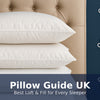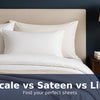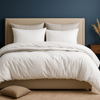Percale vs Sateen vs Linen: Which Bed Sheets Are Best for You?
- by Anthony West
Percale vs Sateen vs Linen: Which Bed Sheets Are Best for You?
Trying to decide between percale, sateen or linen? This clear, UK-focused guide explains how each fabric feels, performs and wears over time—so you can choose sheets that genuinely match how you sleep and how you live.
Weave, Not Just Thread Count
Sheet feel is driven first by the weave, then by yarn quality, finishing and, finally, thread count. A high number with weak fibres won’t feel luxurious for long. Focus on the fabric’s character and how it fits your climate and care routine.
- Percale = one-over/one-under plain weave → cool, crisp, matte
- Sateen = three or four-over/one-under → silky, smooth, subtle sheen
- Linen = woven from flax fibres → airy, textured, lived-in luxury
Quick Comparison
| Fabric | Feel | Best For | Breathability | Wrinkle Level | Care |
|---|---|---|---|---|---|
| Percale (cotton) | Crisp, cool, matte; hotel “fresh” | Hot sleepers, summer, airy rooms | Excellent | Higher (softens with washes) | Easy machine wash; tumble low |
| Sateen (cotton) | Silky, smooth, slight sheen; drapey | Year-round cosy, cooler sleepers | Good | Low to medium | Machine wash; avoid high heat |
| Linen (flax) | Airy, textured, relaxed luxury | All seasons; runs cool in summer | Outstanding | Low (naturally rumpled look) | Machine wash; best line-dried |
Percale Sheets
Percale’s plain weave gives that cool, crisp “freshly made bed” feel. It sleeps cooler than sateen, making it brilliant for warm bedrooms, loft apartments and hot sleepers. The matte finish reads modern and minimal.
- Pros: Breathable; great for hot sleepers; durable; gets softer after a few washes.
- Consider: The crispness means more wrinkles—embrace the relaxed look or tumble briefly and fold warm.
- Best thread-count window: ~200–300 for breathability and drape.
Shop the look: Percale Sheets at Snuggery
Sateen Sheets
Sateen floats more yarns on the surface, producing a silky, smooth handfeel with subtle lustre. It drapes over the body and retains a touch more warmth, ideal for cooler sleepers or anyone who loves a “hotel-lux” vibe.
- Pros: Naturally less wrinkly; soft and cocooning; elegant sheen.
- Consider: Slightly warmer than percale; avoid over-drying to preserve smoothness.
- Best thread-count window: ~300–480 (beyond that can feel heavy or trap heat).
Shop the look: Sateen Sheets at Snuggery
Linen Sheets
Woven from flax, linen offers exceptional breathability and moisture management. It feels airy in summer yet cosy with layers in winter. The natural slubs create texture and a laid-back, high-end aesthetic that softens beautifully over time.
- Pros: Regulates temperature; durable; low-wrinkle appearance by design; ages gorgeously.
- Consider: A touch of initial crispness; relaxes after 2–3 washes. Look for garment-washed or “stone-washed” linen for instant softness.
- GSM sweet spot: ~150–190 GSM for bedding (weight tells you more than “thread count” with linen).
Shop the look: Linen Bedding at Snuggery
Decision Matrix: Pick Your Perfect Fabric
- I sleep hot / south-facing bedroom: Choose Percale or Linen.
- I want silky, hotel-style sheets: Choose Sateen.
- I dislike ironing: Sateen (least wrinkly) or Linen (wrinkles on purpose).
- Best year-round all-rounder: Sateen for cosy, Percale for cool.
- Allergy-aware: High-quality cotton percale or sateen with a mattress & pillow protector.
- Design/aesthetic: Matte look → Percale. Sheen → Sateen. Textured, relaxed → Linen.
Thread Count Myths (and What Matters More)
-
Myth: Higher thread count always equals better sheets.
Truth: Above a certain point, density can trap heat and reduce breathability. -
Myth: A 1,000 TC sheet is automatically luxury.
Truth: Fibre quality, staple length, yarn twist and finishing determine true luxury. - Focus on: Long-staple cotton (or quality flax for linen), responsible sourcing, and finishing (pre-washing/mercerising/garment-washing).
Care: Keep Your Sheets Luxe for Longer
Washing
- Wash cool to warm (30–40°C) with a gentle liquid detergent. Avoid bleach and heavy fabric softeners (they coat fibres).
- Wash sheets on their own when possible; zip duvet cover before washing.
Drying
- Percale: Tumble low, remove promptly; a light iron brings crispness.
- Sateen: Tumble low or line dry; avoid high heat to preserve sheen.
- Linen: Best line-dried; if tumbling, use low and remove slightly damp to keep drape.
Storage
- Store fully dry in a cool, ventilated cupboard. Slip the set inside one pillowcase for a tidy stack.
Build Your Perfect Bed (By Season)
- Summer (warm bedrooms): Percale or Linen sheets + 4.5 tog duvet or lightweight coverlet.
- Spring/Autumn: Percale or Sateen + 7.5–10.5 tog duvet.
- Winter: Sateen or Linen layered with brushed cotton pillowcases + 12–13.5 tog duvet and a throw.
Shop Sheets by Feel: Cool | Silky | Airy
FAQs
Is percale or sateen better for hot sleepers?
Percale sleeps cooler thanks to its breathable plain weave. Linen is the coolest overall if you like a textured feel.
Do sateen sheets pill?
Quality sateen woven from long-staple cotton resists pilling. Wash inside-out, avoid rough loads, and skip harsh softeners.
Are linen sheets scratchy?
Good linen is air-washed/garment-washed for softness from day one and gets even softer after a few washes.
What thread count should I pick?
For breathability and luxury feel: Percale 200–300, Sateen 300–480. For linen, look at GSM 150–190 instead of thread count.
How do I reduce wrinkles without ironing?
Shake out after wash, tumble low and remove promptly. Fold warm—or embrace linen’s naturally relaxed look.
Still undecided? Try by bedroom temperature.
19–22°C and you sleep warm? Choose Percale or Linen.
16–19°C and you want cosy drape? Choose Sateen.
Design-led, relaxed texture? Choose Linen.
Find Your Perfect Sheets Upgrade Your Pillows



